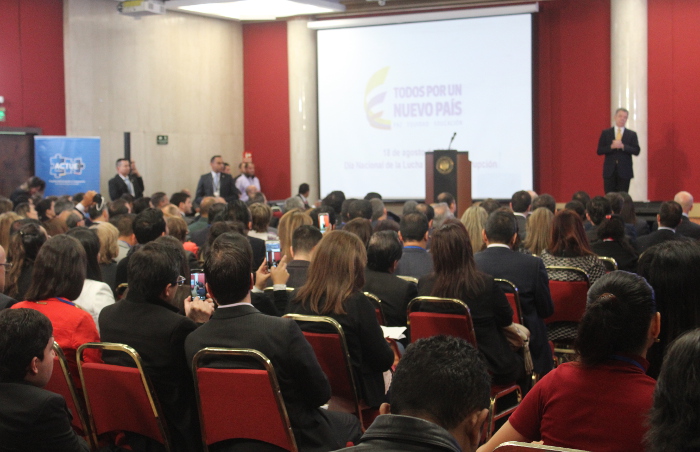-
31 August 2017
Category : Reportage
Comprehensive commitment to transparency in Colombia
The ACTUE-Colombia project seeks to strengthen transparency and integrity in the Colombian public and privates sectors and in civil society

Colombia drags behind it the tragic figure of 218 thousand deaths and nearly six million displaced persons, all attributable to an armed conflict that lasted for over fifty years. A conflict that assails Colombian society at all levels, where one of the major factors responsible for the perpetuation of this context of violence has been corruption.
Today Colombia is looking forward, placing all its hopes on an arduous peace process that must take into account all stakeholders in society. A key piece in advancing in this peace process is the commitment to transparency and prevention of corruption in both the country’s public institutions and private entities.
Along these lines, the ACTUE-Colombia project was launched in 2014 as a response of the European Union to a request from the Colombian government for strengthening and implementation of public policies aimed at fighting corruption. This is a project funded by the European Union and managed by FIIAPP that works hand in hand with various Colombian public institutions, such as the Secretariat of Transparency, the Civil Service Department, the Ministry of Health, the Ministry of Mines, the Public Prosecutor’s Office and the Council of State, as the representative of the judiciary, among others.
This project seeks to create a comprehensive approach in corruption prevention that will work from four strategic areas with special impact in the country:
Public Integrity and Open Government: Creation of an open and transparent government through instruments such as the transparency and access to public information law, accountability, citizen participation, public ethics, whistleblower protection, among others. As expressed by Liliana Caballero, director of the Civil Service Administration Department, “for the government it is very important that citizens trust the State and the employees of public administrations, and citizens should have the security that they have access to all the information, that there is no longer any secrecy in any proceedings, in the budgetsâ€.
Version:1.0 StartHTML:000000224 EndHTML:000003796 StartFragment:000003501 EndFragment:000003748 StartSelection:000003501 EndSelection:000003748 SourceURL:https://www.fiiapp.org/wp-admin/post.php?post=7856&action=edit

Sectoral Action: to foster integrity and transparency, it is also necessary to act in specific sectors such as judicial bodies, health, the extractive industries and a culture of integrity.
- Colombia’s Council of State is working to promote transparency, accountability and judicial ethics. To serve as a precedent, the Council of State on 29 June held a public hearing for accountability, which was the first time a judicial body had ever organised an accountability event in the country.
- The extractive industry is one of the most important economic sectors in Colombia; in 2015 the extractive industry was responsible for 7.2% of the country’s GDP, and therefore it is important to keep this economic activity clear of networks of corruption. To accomplish this, implementation of the Extractive Industries Transparency Initiative (EITI) throughout the country is being incentivised, and there are currently commitments to implement this initiative by the 16 leading extractive companies in Colombia, which represent 80% of mining production.
- In the health sector, ACTUE-Colombia has been supporting what some call “radical transparency†in the country’s pharmaceutical policy, with a view not only to guaranteeing right of use and access to a quality and transparent service but also to recovering citizens’ trust in the sector. To assure these objectives, initiatives have been developed that involve various stakeholders and donors, such as the Decalogue for Transparency and Integrity in the health sector, and tools for access to information have been implemented, such as the Medicamentos a un Clic [One-click Medicines], a web platform for health professionals, and the Termómetro de Precios de Medicamentos [Medicine Price Thermometer], among others.
- Additionally, ACTUE-Colombia supports the commitment of the national government to promoting a cultural change, as there is wide recognition that the laws are important but insufficient. Along these lines, the Pedagogic Routes for Promotion of Transparency, Integrity and Safeguarding the Public Good have been implemented with the aim of raising awareness in school and university classrooms and in public institutions of their role in this cultural change in personal and institutional conduct.
Citizen participation and the private sector: Both citizens and businesses are key players in the fight against corruption. To create a healthy, upstanding and aware society, it is necessary for them to be participants in the cultural, institutional and regulatory changes.
- To promote the shared responsibility of business owners in the prevention of corruption, continuity has been given to initiatives that promote business ethics, self-regulation, bribery prevention and clear rules, such as the Registry of Private Companies Active in Compliance with Anti-corruption Measures (EACA) and the Handbook of Transparency and Anti-corruption Business Agreements.s
- To engage civil society in the fight against corruption and the promotion of transparency and integrity, support has been given to actions such as strengthening of the National Citizen Council for Fighting Corruption, promotion of a “Friends of Transparency” network and improvement of accountability in citizen participation forums, as well as in NGOs, among others.
Territorial Open Government: The change must take place at all political levels, from the national government to territorial governments. This area strengthens regional and local capacities in the implementation of the law on transparency; attention to citizens and management of corruptions risks; promoting citizen participation, social control and accountability. Additionally, the creation of a network of open governorates is being driven with a view to promoting exchange and peer-to-peer learning.
The coordination work and the comprehensive approach of ACTUE is facilitating the steps being taken towards real change in Colombia, however ending the culture of corruption is a task that requires the commitment and joint work of all stakeholders in Colombian society.
The views and opinions expressed in this blog are the sole responsibility of the person who write them.






